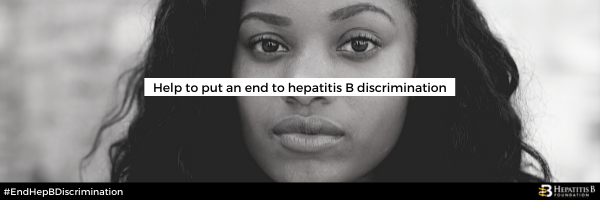
Every year, UNAIDS marks March 1st as Zero Discrimination Day. This year, Zero Discrimination Day highlights “the urgent need to take action to end the inequalities surrounding income, sex, age, health status, occupation, disability, sexual orientation, drug use, gender identity, race, class, ethnicity and religion that continue to persist around the world”.
Although hepatitis B affects about 300 million people worldwide, hepatitis B related discrimination still is pervasive. In fact, the Hepatitis B Foundation has been documenting these inequalities through our Discrimination Registry. Since May of 2021, we have documented over 250 cases of hepatitis B related discrimination from all over the globe. Of these cases, 213 individuals experienced discrimination personally and 151 knew of people who were discriminated against. Within these reports, people have described instances where they have been denied employment or lost employment due to their hepatitis B status or had been denied educational opportunities or immigration to another country. The top 10 countries where people have reported hepatitis B related discrimination are the Philippines, Nigeria, India, Pakistan, United States, Ghana, Uganda, Ethiopia, Bangladesh, and Sierra Leone. The Hepatitis B Foundation is aware that discrimination is happening around the world and encourages people to report any discrimination on the registry here.
Notably, the United States is in the top 10 countries where people have reported hepatitis B discrimination. Most of the reporting within the United States comes from individuals in the military living with hepatitis B. Currently, the military in the United States and many countries unethically prohibits individuals with hepatitis B to serve due to outdated guidelines. Now, since most individuals within the military setting should be vaccinated against hepatitis B and with the accessibility of hepatitis B antiviral therapy which can control the virus, the risk of transmission is extremely low. These guidelines should be updated to reflect national policies in the United States that prohibit discrimination. In the broader setting of the U.S. outside of the military, it is illegal to discriminate against people living with hepatitis B. The Americans with Disabilities Act (ADA) prevents employers, institutions, and other organizations from discriminating against an individual based on their hepatitis B status. The Hepatitis B Foundation hopes to one day end hepatitis B related discrimination not only in the United States, but also globally.
Ending hepatitis B related discrimination globally will require incredible effort from multiple partners like governments, organizations, community advocates, and people living with hepatitis B. The first step is demonstrating that discrimination is a serious issue around the world that impacts one’s life in a variety of ways, both economically and psychologically. The discrimination registry that we launched in 2021 will help us document discrimination around the world and help us determine areas of focus. We want to publish and share what we find from this registry so academic partners, policy leaders, advocates and health professionals can be made aware of the current situation and challenges people living with hepatitis B face. We hope to maintain this registry so we can assist people experiencing hepatitis B related discrimination. And we want to create a global movement to enact change, advocating for ending policy and practice that allows for discrimination, and instituting policies that protect people with hepatitis B worldwide. But we need your help – people living with hepatitis B, and people who have faced discrimination, are the most important partners in this effort! We need you as partners, to maintain the registry and fight hepatitis B related discrimination, and ensure the fight for equality continues. We are currently fundraising to keep the Discrimination Registry going and expand on these plans to help fight discrimination globally.
This fight against discrimination will take some time! Change does not happen overnight. Improving awareness, growing an advocacy movement, engaging leaders and decision makers, and especially changing policy, can take years – but we must continue our work together. The Hepatitis B Foundation has long been dedicated to assisting in discrimination related causes. In fact, the Hepatitis B Foundation played a key role in a landmark settlement by the U.S. Department of Justice that established protection for people with hepatitis B under the Americans with Disabilities Act (ADA). That effort took three years to see policy change once we took up the fight, but it was worth it to have protections in place for people with hepatitis B. Learn more in our Know Your Rights section.
On Zero Discrimination Day, March 1st, and moving forward, please continue to use your voice to speak out against discrimination. If you need assistance please fill out the Discrimination Registry to document your experience and the Hepatitis B Foundation will try its best to assist you and navigate you through it.


 By Christine Kukka
By Christine Kukka
